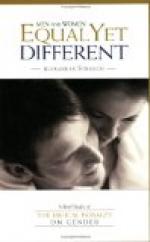Amidst her general activity, many questions arise as to what further avenues of usefulness may properly open. How far may she engage in business, and in what branches? what is her proper work in the Church, and to what extent may she perform public religious services? is she properly a citizen, and what privileges or rights should she enjoy?—are inquiries which are considered and discussed. The greatest interest is at present excited by the question, “Should women have the ballot?” and both in this country and in England it has able advocates and strong opponents.
It can not be denied that the answer of the large majority is in the negative, and that in many instances this answer comes in the form of the laugh of ridicule or in the sneer of contempt. Such is the fate of all incipient efforts for reformation; but where a cause is intrinsically just, it can survive and triumph.
Without entering into the general discussion, two points may be briefly noted. First, this question is considered only in Christian lands. It is not even heard of elsewhere. It is mooted only in countries where the Bible is placed in the hands of the common people. It is strong only where free institutions have been established, and where liberal ideas have prevailed. It is the outgrowth of Bible freedom. Secondly, many of its opponents are persons of strong intellect, of broad views, of great benevolence, and of unquestioned piety. Yet in the opposition we find also all, or nearly all, of the most ignorant classes of society.




